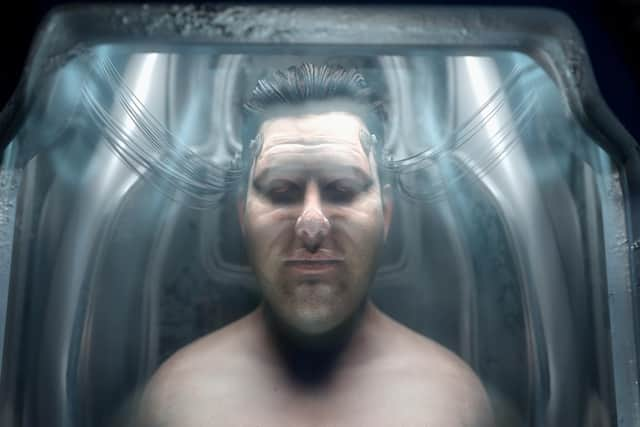Film reviews: Malcolm & Marie | A Glitch in the Matrix | Bliss | Simple Passion


Malcolm & Marie (15) ***
A Glitch in the Matrix (15) ***
Bliss (15) **


Simple Passion (18) **
Written, shot and edited quickly last summer while Covid restrictions brought most of the movie industry to a halt, Malcolm & Marie offers something of a navel-gazing response to the forced intimacy of lockdown courtesy of a chamber piece about a movie industry couple tearing strips off each other as they confront hard truths about their relationship. The brainchild of Sam Levinson, son of Diner director Barry Levinson, it stars Tenet’s John David Washington and rising star Zendaya as the eponymous Malcolm and Marie – the former an arrogant filmmaker buzzing off the successful premiere of his directorial debut, the latter his beautiful girlfriend whose contribution to his film’s success he’s forgotten to acknowledge.
That snub is the catalyst for an escalating series of shouting matches as they slink around the gorgeous interiors of their luxurious rented house – all of it shot in sleek black and white, which gives the film an instant cinematic sheen that helps offset the innate theatricality of the characters’ call-and-response monologuing. But such stylistic affectations also feed into the film’s themes, specifically the cultural obsession with authenticity in art and who has the right to tell what story, subjects upon which Malcolm and Marie expound at length when it becomes apparent that Malcolm has drawn inspiration for his movie’s exploration of addiction from Marie’s life.
Advertisement
Hide AdThe film itself has been explicitly conceived to interrogate said obsession with authenticity. Indeed, you can practically feel Levinson, a white filmmaker, goading critics (and the wider Twittersphere) into taking him to task for daring to make a movie about race. But just in case we don’t make that leap, he handily does it for us by making the off-screen villain of the piece a critic for the LA Times whose rave review of Malcolm’s film still manages to turn him apoplectic with rage. As it happens, this is also the film’s most entertaining, albeit ridiculous, scene. Repeatedly calling out the critic’s whiteness while pointedly never using her name, Malcolm mocks this writer’s wokeness, her inability to distinguish between a dolly shot and a steadicam shot (a fair point) and, most ludicrously of all, takes issue with the way her review makes his gritty, politicised movie about addiction sound like a gritty, politicised movie about addiction.


However, his tirade – delivered with extraordinary physicality by Washington (clearly enjoying hamming it up) – does contain some perceptive points too, and Malcolm’s resentments can't help but expose the delicate egos of those working in such a well-remunerated, nepotistic profession as the film industry. That however, it is also part of the meta design of the movie, a self-reflexive way for Levinson to steal critical thunder while simultaneously critiquing professional critics, who, of course, aren’t and shouldn’t be above mockery or satire – even in a movie made by the son of a famous movie director starring the son of a famous movie star.
Having chronicled Kubrick fans obsessed with The Shining in Room 237, filmmaker Rodney Ascher turns his attention to another pop-culture-inspired phenomenon in A Glitch in the Matrix – an investigation into “simulation theory,” an alternate-reality hypothesis that suggests we’re actually simulations living in an artificially created world controlled by super-intelligent computers in the future. First crystallised by sci-fi author Philip K Dick in the 1970s, then popularised by the release of The Matrix in 1999, the idea was given philosophical weight by Oxford University professor Nick Bostrom in the early 2000s and has since gained traction with a whole slew of people, from tech billionaires like Elon Musk to lowly gamers too plugged-in to their virtual worlds to be able to engage with people in a real way. As he did with Room 237, Ascher takes a non-judgmental approach to both his subject and his interviewees, but while some of the speculative stuff is fun, the film’s over-reliance on excitable YouTubers expounding on reality-frying concepts can get a little wearying and it’s only when Ascher delves into the dark side of simulation theory that the film really starts pushing at something interesting.
Coincidentally, simulation theory is also at the heart of Bliss, the new sci-fi drama from Another Earth director Mike Cahill. Owen Wilson stars as a divorced office drone whose addiction to prescription painkillers is about to lose him his job. When an altercation with his boss forces him to go on the run, a homeless woman (Salma Hayek) with reality-bending powers convinces him they’re living in a computer simulation designed to make people more appreciative of the luxurious life they’re really living. Though the film jumps between both worlds, Cahill isn’t all that interested in maintaining a sense of ambiguity about which version is real. Tipping its hand early, the film uses the concept to explore what constitutes a meaningful connection in life, which is all very well, but the sci-fi bells and whistles promise more than the film delivers.
A French literature professor in the grip of an erotic obsession is the starting point for Simple Passion. Laetitia Dosch takes the lead as single mother Hélène, a smart woman whose vigorous sexual exploits with an emotionally detached Russian embassy official (Sergei Polunin) start having a deleterious effect on her life, her career and her relationship with her young son. As a drama about the complex psychology of self-destructive desire, it’s all bit arthouse 101.


Malcolm & Marie is streaming on Netflix from 5 February; A Glitch in the Matrix is available on digital demand from streaming platforms and select virtual cinemas; Bliss is available on Amazon Prime; Simple Passion is available on digital demand at Curzon Home Cinema
A message from the Editor
Advertisement
Hide AdThank you for reading this article. We're more reliant on your support than ever as the shift in consumer habits brought about by coronavirus impacts our advertisers.
If you haven't already, please consider supporting our trusted, fact-checked journalism by taking out a digital subscription at https://www.scotsman.com/subscriptions
Joy Yates, Editorial Director